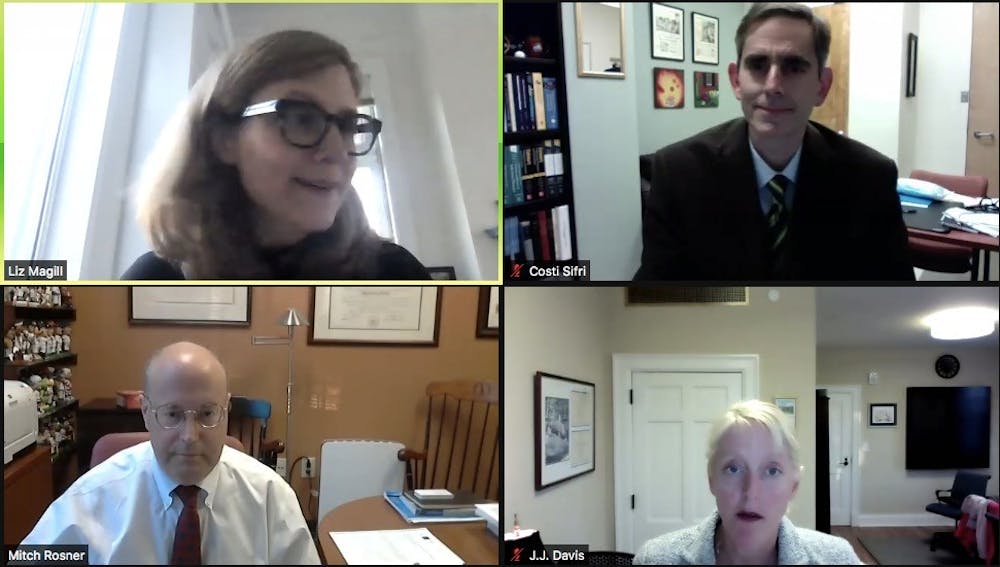Social distancing, mask wearing and hand-washing were among the top actions that Department of Medicine Chair Mitch Rosner, University Chief Operating Officer J.J. Davis and Costi Sifri, director of hospital epidemiology in the University Health System, recommended to students heading home for break during a panel event hosted by Provost Liz Magill Thursday.
“We want you to minimize the risk to your family and friends at home,” Rosner said. “As we move out of the holidays, we want you just to be cognizant of the U.Va. policies for returning to Grounds in the spring semester and stay in touch with us as those policies may change.”
The webinar, which had around 600 people in attendance, gave community members the opportunity to ask questions about the safest ways to self-quarantine and stay healthy to keep themselves and their communities safe while traveling home for Thanksgiving and winter break.
Sifri said that cases are rising not only nationwide, but in Virginia and on Grounds as well. Although the University has increased its testing capacity and positivity rates are declining, the number of active cases increased from 66 Nov. 12 to 86 Wednesday. According to Sifri, this is mainly because of colder weather prompting more gatherings indoors, lower compliance with public health measures and the highly infectious state of COVID-19 itself. The main issue, Sifri said, is rooted in the fact that the holiday season will spark numerous small gatherings and that even those are not necessarily safer than larger ones.
Aside from encouraging Zoom gatherings for holiday events, Rosner outlined the current testing system for University community members. On Grounds students are notified that they are required to report for either saliva screening or nasal swab testing on an assigned date depending on their dorm and can then volunteer to take one more before leaving Grounds up until Nov. 24. Saliva screening has an 85 percent sensitivity rate, meaning that if 100 people positive for COVID-19 take the test, it will detect 85 of those cases.
While negative tests prior to departure are reassuring, someone could potentially be infected directly after testing, or they could have gotten tested too soon for the virus to incubate and therefore too soon for the test to detect it, Rosner said. A person who has contracted COVID-19 may show symptoms anywhere up until 14 days after exposure, though the average is 4 to 5 days.
“Please recognize that while we are doing testing and we're trying to provide people with negative tests prior to departure … that testing has limitations, and those limitations make continued adherence to public health protective measures critically important,” Rosner said. “Please remember that no test is 100 percent sensitive, so continued vigilance with the public health measures should not be relaxed by testing.”
Such protective measures include limiting interaction with others, wearing a face covering regardless of the setting, limiting time in contact with others and the number of people present in a given situation and waiting until a definitive negative test before leaving Grounds.
The same applies to traveling. One should bring extra masks and hand sanitizer and try to stay as distanced from others as possible, according to Sifri. Once home, one should consider minimizing all gatherings with people for the first 10 to 14 days and getting tested one week after arrival, if circumstances allow. For those who have already had COVID-19, experts don’t think a person is at risk for transmitting the virus after they've recovered from infection, Sifri said.
In addition, Sifri said that people should avoid sharing food and hosting gatherings, but if one does, to make it a short, small and outdoor event and to monitor the behavior of the planned attendees.
“We've had a successful fall, [and] we are now nearing the end of the semester,” Sifri said. “However, what we are seeing is that the conditions are ripe for the virus to spread. In particular, as we head into the holiday season … it's very important to understand that it's not just our families.”
Come spring semester, which starts on Feb. 1 due to an extended winter break, Rosner intends to continue the same methods of testing, quarantining, isolation and contact tracing that the University “worked really hard” on during the fall semester.
Similar to the fall semester process, students returning to Grounds will use the LetsGetChecked mail order PCR nose swab tests and send it in 10 days prior to arrival. Post-arrival testing of all students will take place within five to seven days of returning to Grounds. Employees will also have access to this testing. For those who display symptoms or have been identified as a close contact of someone who tested positive for COVID-19, there will be a separate testing process available, Rosner said.
Although Rosner said that it would be “too early” to say anything about a possible delay of spring semester given the circumstances of rising cases right now, Magill said that the University aims to have more in-person classes in the spring semester and that the outdoor tents will be up and heated during the colder months.
After the fall, Magill said that she knows of no known transmissions of the virus in the classroom and has faith in the University’s ability to increase testing for students and faculty who will be interacting with each other on Grounds. However, each of the schools are still in the process of determining their own modes of instruction, she said.
“It's been an unprecedented time on Grounds in Charlottesville and in the country,” Magill said. “I think all of us have been struck by the resilience, the creativity and the sense of community among our faculty, our staff and our students … We've come together as one university in new and very innovative ways. I'm grateful to the entire extended community for everything they've done this semester.”







